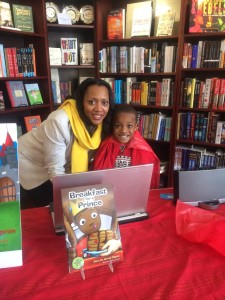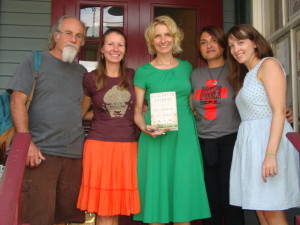Here are the facts: There were almost 300,000 books published in the U.S. in 2012 according to our friends at Wikipedia. Nearly half of those titles are self-published. Publishers Weekly counted roughly 12,000 bookstores in the U.S. in 2013. Do the numbers and it isn’t difficult to see why retail booksellers are often overwhelmed with local and/or indie authors.
As Chris Lunda’s recent post, The Self-Publishing Revolution points out the changes that have taken place in the publishing world are a benefit to would-be authors who have a story they would like to share. For booksellers this means we have a seemingly endless selection of titles to discover and recommend to our costumers. Endless isn’t always a good thing.
I strongly believe that part of my calling as an independent bookseller – and fellow author – is to feature and promote local authors whether they come to us through a publisher or are self-published.
I have learned it is part of my job to set expectations for these aspiring best-sellers. Many authors walk through our doors with high expectations thanks to articles like this one making it seem super-easy to land a spot in a well-known European chain, How to get your Self-Published Books into Bookstores
Conversely, booksellers are often disappointed when author appearances don’t bring in a stream of customers and lots of sales. Even helpful articles like this one on how to work with consigners, Working with Self-Published Authors, can be misleading. Author events in a small retail shop like ours sometimes only bring in a handful of people. And that’s not necessarily a bad thing as long as expectations have been set.
There are a variety of approaches to working with indie authors and while we may not charge fees for anything at the moment, other retailers have successful business models that have a variety of price tags ranging from a $30 stocking fee to several hundred for marketing and promotion.
Regardless of the business arrangements in place there are a few dos and don’ts we’ve found to be extremely beneficial so that we are on the “same page” with our indie authors, most of who are on consignment. Here are a few pointers that may be of help to others and I’d certainly welcome additional tips and words or advice.
- Do have a written agreement in place with sales terms.
- Do specify a shelf life for the book – some titles are easy fits and remain good sellers, others are a gamble.
- Do encourage potential consigners to schedule an appointment otherwise it may not occur to them to NOT come in to drop off and discuss their title on a busy Saturday afternoon.
- Do be clear about the number of attendees to expect when planning an event. A launch party for a new book might bring quite a few family, friends and indie author supporters, a fifth signing in the area might not be as successful.
- Don’t assume the author knows what your role is in planning a signing or reading. If it is up to the author to publicize the event, make that clear.
And most importantly, don’t leave an author unattended if throngs of fans don’t surround them. Trust me, for most authors nothing is more difficult than promoting their work, and by extension themselves. I HATE when an event isn’t well attended, not because the store isn’t making money but because I feel the author’s disappointment. Engage your guest in conversation about their work – all the better if you’ve actually had time to read their book. Sit and have a cup of coffee with them and be their audience. As I said before sometimes it isn’t about the number of books sold but about the shared experience. Make it a good one for all involved.
Featuring local authors — celebrity or not — is an important part of being an Indie bookseller, but it ain’t always easy! Pictured above left, Jannie Pilgrim and her son Garrett, who stars in her children’s story “Breakfast With a Prince” and authors’ John Smith, Caroline Scutt (aka me), Elizabeth Gilbert and Rayya Elias during a Penguin Book event.


